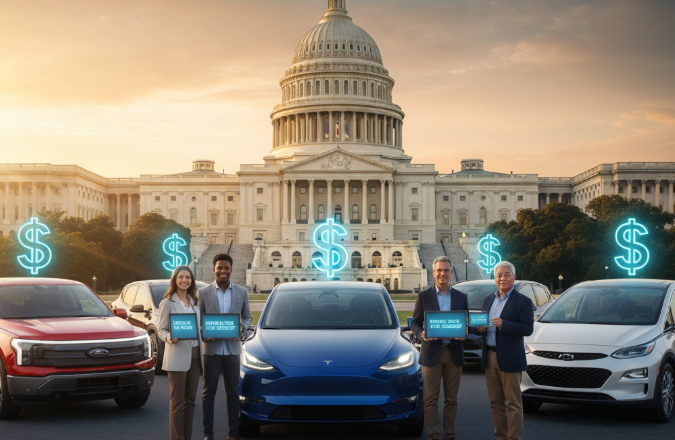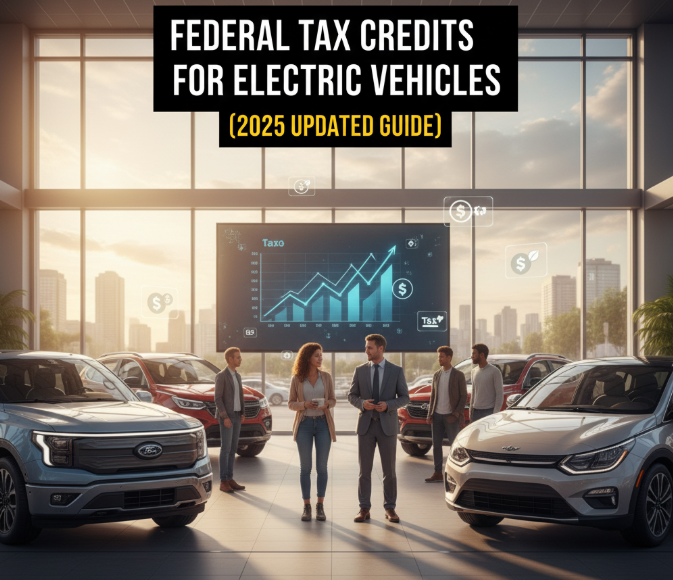Introduction
Electric vehicles (EVs) are no longer a futuristic idea—they are becoming the new normal in the U.S. With more automakers releasing affordable and luxury EV options, the federal government is stepping up with incentives to encourage drivers to make the switch. One of the biggest financial perks available in 2025 is the federal tax credit for electric vehicles, which can significantly reduce the cost of purchasing a new EV.
But here’s the catch: the rules for these credits are not the same as they used to be. With updates from the Inflation Reduction Act (IRA) and stricter requirements starting in 2025, many car buyers are asking: Which vehicles qualify, how much money can I actually save, and how do I claim these credits?
This updated 2025 guide will walk you through everything you need to know about federal EV tax credits—explained in simple, clear language. By the end, you’ll know exactly how these credits work, which cars qualify, and how to make the most of them when buying your next electric ride.
What Is the Federal EV Tax Credit?
The federal EV tax credit is a financial incentive that helps lower the cost of buying a new or used electric vehicle in the U.S. It works by reducing the amount of income tax you owe when you file your tax return.
- For new EVs, the credit can be up to $7,500.
- For used EVs, the credit can be up to $4,000 (or 30% of the car’s price, whichever is lower).
In 2025, buyers don’t have to wait until tax season to claim this benefit. Thanks to new rules, you can transfer the credit directly to the dealership at the time of purchase. This means instant savings—no waiting months for a refund.
Key Changes in 2025 You Should Know
Several new rules went into effect this year that could affect your eligibility:
- Final Assembly in North America
The EV must be assembled in the U.S., Canada, or Mexico to qualify. - Battery Component and Mineral Sourcing Rules
- A portion of the battery minerals must come from the U.S. or approved trade partners.
- Battery components must not be sourced from “foreign entities of concern” (like China).
- Price Caps on Vehicles
- Sedans: Must cost $55,000 or less.
- SUVs, trucks, vans: Must cost $80,000 or less.
- Income Limits for Buyers
To qualify, your income must not exceed:- $150,000 (single filer)
- $225,000 (head of household)
- $300,000 (married couple filing jointly)
- Point-of-Sale Credit
Starting January 2024 and continuing in 2025, you can transfer the credit to the dealership. This lowers your upfront cost immediately.
Which Cars Qualify for the Federal EV Tax Credit in 2025?
Not every EV on the market qualifies. Here’s a simplified table of popular EVs in 2025 and their eligibility:
| EV Model (2025) | Credit Amount | Eligibility Notes |
|---|---|---|
| Tesla Model Y (SUV) | $7,500 | Meets assembly & battery requirements |
| Chevrolet Bolt EUV | $7,500 | Affordable and fully eligible |
| Ford F-150 Lightning | $7,500 | Only certain trims qualify under price cap |
| Hyundai Ioniq 6 | $0 | Fails North America assembly requirement |
| Kia EV6 | $0 | Assembled outside North America |
| Rivian R1T | $3,750 | Partial credit, battery sourcing issues |
| Volkswagen ID.4 | $7,500 | U.S.-built versions qualify |
| Nissan Ariya | $0 | Assembled in Japan, does not qualify |
👉 Pro Tip: Always confirm eligibility on the official IRS list of qualifying EVs before purchasing.
How Much Can You Actually Save?
Let’s break down an example:
- Suppose you buy a Tesla Model Y priced at $54,000.
- You qualify for the $7,500 federal tax credit.
- At the dealership, you transfer the credit immediately, dropping the price to $46,500.
- Some states (like Colorado, California, and New York) offer additional rebates—potentially saving you another $2,000–$5,000.
This means you could drive away in a brand-new Tesla Model Y for under $42,000.
Federal EV Tax Credit for Used Cars (2025)
Yes, you can also get tax credits for used EVs, but the rules are slightly different:
- Credit Amount: Up to $4,000 (or 30% of the car’s price).
- Car Price Limit: Vehicle must cost $25,000 or less.
- Model Year Rule: Must be at least 2 years old at the time of sale.
- Buyer Income Limits:
- $75,000 (single filer)
- $112,500 (head of household)
- $150,000 (married couple filing jointly)
This makes EV ownership even more affordable for budget-conscious buyers.
How to Claim the Federal EV Tax Credit in 2025
There are two ways to benefit:
1. At the Dealership (Instant Discount)
- Choose a qualifying EV.
- Inform the dealer you want to transfer the credit.
- The dealer reduces the purchase price on the spot.
2. On Your Tax Return (If Not Claimed at Sale)
- File IRS Form 8936 when submitting your federal tax return.
- Enter details of your EV purchase (VIN, purchase date, etc.).
- The credit reduces your total tax owed.

Common Mistakes to Avoid
Many buyers miss out on credits because of simple errors. Here are pitfalls to watch out for:
- Buying an EV that doesn’t qualify (assembled outside North America).
- Exceeding income limits and assuming you’ll still get the credit.
- Buying a vehicle over the price cap.
- Not checking VIN eligibility. Even the same car model may or may not qualify depending on where it was built.
Federal EV Tax Credit vs. State Incentives
On top of federal credits, many states offer extra rebates and perks. Here’s a quick comparison of a few states in 2025:
| State | Incentive Type | Savings Amount |
|---|---|---|
| California | Rebate | $2,000–$7,500 (varies by income & car type) |
| Colorado | Tax Credit | $5,000 (new EVs) |
| New York | Rebate | Up to $2,000 |
| Oregon | Rebate | Up to $2,500 |
| Texas | Rebate | Up to $2,500 |
Stacking federal and state benefits can reduce the cost of EVs dramatically.
Why These Tax Credits Matter
The U.S. government offers these incentives not just to save you money but also to:
- Reduce carbon emissions
- Decrease reliance on fossil fuels
- Encourage domestic EV and battery production
- Support job growth in clean energy industries
By making EVs more affordable, the government hopes to speed up the transition to a greener transportation future.
Tips for Maximizing Your EV Savings in 2025
If you’re serious about saving, here’s what you can do:
- Check IRS Lists Before Buying – Rules change frequently.
- Compare State Rebates – Some states offer more generous incentives.
- Buy Before Rules Tighten – Battery sourcing rules may get stricter.
- Consider a Used EV – Great option if you’re on a budget.
- Talk to Your Dealer – Make sure they are IRS-registered to handle point-of-sale credits.
Quick FAQ Section
Q: Can I get the full $7,500 credit on every EV?
No. The amount depends on where the car is built, battery sourcing, and the price cap.
Q: Do hybrids qualify for the credit?
Only plug-in hybrid electric vehicles (PHEVs) with sufficient battery capacity qualify. Regular hybrids do not.
Q: Can I claim both federal and state incentives?
Yes! You can stack them for maximum savings.
Q: Do I need to owe $7,500 in taxes to get the credit?
Not anymore. With the dealership transfer option, you can still get the full benefit even if your tax liability is lower.
Final Thoughts
The federal EV tax credit in 2025 makes owning an electric vehicle more affordable than ever. With up to $7,500 off new EVs and $4,000 off used EVs, these incentives can drastically reduce your upfront cost—especially when combined with state rebates.
However, the rules can be tricky. From price caps and income limits to battery sourcing requirements, it’s important to do your homework before signing on the dotted line.
If you’re planning to buy an EV in 2025, make sure your chosen vehicle qualifies, confirm dealership eligibility, and take advantage of instant point-of-sale savings. With the right planning, you could drive away in a high-tech, eco-friendly car at a much lower cost.
🚗💡 The bottom line: The 2025 EV tax credits are a golden opportunity for smart buyers. Don’t miss your chance to save big while joining the clean energy revolution.

